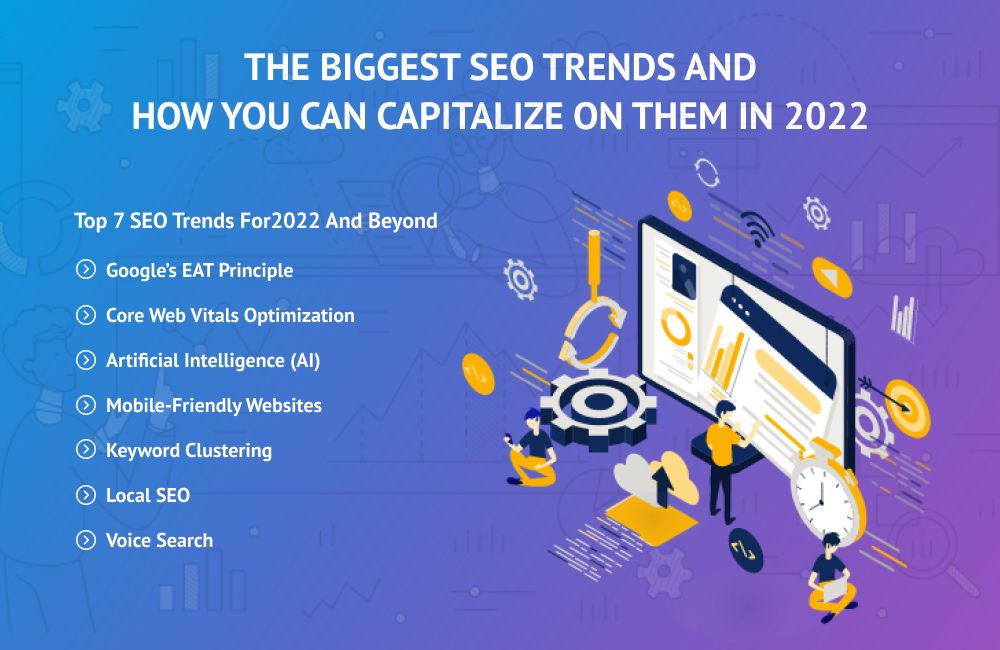Search engine optimization (SEO) improves a website or an app’s presence (or ranking) in the search results returned by a search engine. It is one of the youngest marketing disciplines and is evolving at an incredibly fast pace. Just like the all-powerful Google algorithm, the SEO industry is unpredictable. Enhancing page visibility and organic traffic is, for all the right reasons, a prime focus for every business and digital marketer.
The only constant in the world is change; and making changes to your SEO strategy is essential, to progress. Now is an ideal time to plan your digital marketing campaigns for the coming season. The team at QualDev, an ecommerce website development company, has developed a list of the most important SEO trends for 2022 and how businesses can leverage them.
Top 7 SEO Trends for 2022 and Beyond
1. Google’s EAT principle
When it comes to SEO, few things remain the same. Google’s EAT principle is one of them. EAT stands for Expertise, Authority, and Trustworthiness. These three elements help a search engine decide how to rank pages on the results page for a given search. EAT is not the algorithm itself, but the framework on which it is based.
A few ways to ensure you get the basics of SEO right include –
- Having positive customer reviews
- Using just the right language (to help someone searching for your services find your website)
- Linking to other digital assets that lead to your site
- Creating and optimizing content that is likely to be shared (blogs, articles, or videos that will capture the attention of your target audience)
2. Core Web Vitals Optimization
Core Web Vitals is a quantifiable analysis of the pages on your website or app. It is now officially a Google ranking factor. Core Web Vitals include the following performance metrics –
- LCP – The amount of time it takes the largest content asset on the page to load.
- First Input Delay (FID) – The time your site takes to respond to a user’s first interaction.
- Cumulative Layout Shift (CLS) – A count of the number of unexpected layout shifts that occur during the lifespan of the page.
Google has verified that starting May 2021, Core Web Vitals will determine the rank of a page. However, at the end of the year announcement, Google said that the impact would be limited to mobile search results.
3. Artificial Intelligence (AI)
SEO is rooted in shifting sands. The rules and most promising practices continually evolve. Tracking the shifts and implementing affiliated strategies might be more than challenging. Fortunately, thanks to novel AI-powered technology, you do not need to hire a whole unit to tackle your SEO needs. The standout point of AI is that it is always learning, changing, and evolving – precisely what you want for your SEO. AI-based SEO is both the present and the future of assuring that your website ranks where it should – at the top.
4. Mobile-friendly Websites
Mobile device usage has skyrocketed in the past few years. Nearly every person has a smart phone now, and the number of people using them to find things on the internet is increasing as these devices become more accessible. Mobile SEO is the process of optimizing your website to ensure your site looks great and performs optimally on mobile devices. Providing users with a positive experience by ensuring that your website works seamlessly on any device, regardless of the size of its screen goes a long way towards bolstering your company’s mobile SEO strategy.
5. Keyword Clustering
Keyword research is the foundation of SEO. As Google’s natural language processing (NLP) technology becomes progressive, effective keyword targeting has evolved beyond being a complicated process. Google ranks your landing pages for multiple keywords and not just a single word. Keyword clustering can help to level up your total keyword rankings as it makes use of the principle of using numerous keywords with similar search intent to propel web pages that target those “clusters.”
6. Local SEO
Locals love locals. You should update the listings of your website or online business from a regional standpoint. The listings should have accurate local information about your business. Doing so provides you with a massive plus point in SEO. In a few minutes, your customer can check your address, phone number, hours of operation, product listings, etc. If you cite your city, community, metro area, and neighborhood on your website and develop a local SEO strategy, you will get visits from a more relevant audience. Good ecommerce website development company will prioritize this.
7. Voice Search
Alexa and Siri have been with us for a couple of years now. They are our friends who make life easy. However, what does that mean for SEO? You should hire a pro to optimize voice search. Content-based questions, relevant answers, and a complete discussion can also bring in those users who prefer voice searches rather than typing in what they are looking for.
Looking at 2022 and Beyond from an SEO Perspective
An Updated and optimized website with truthful, relevant information tends to rank high. SEO is a fast-paced industry. The people who were quick to “get it” found themselves ahead of their slower-moving competitors.
If your business is failing to surge ahead of competitors in terms of online presence and digital marketing, it means only one thing – you need to revisit and rethink your SEO approach. Get in touch with the QualDev team to understand how we help small, mid-sized, and large businesses establish and expand their online presence using highly effective and future-ready SEO strategies. Explore the range of SEO services and solutions we offer.

